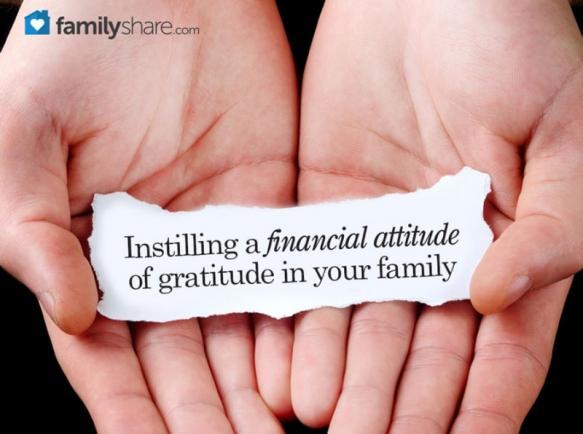
If we approach our money and financial decisions from an attitude of scarcity, we will always come from a position of fear. If, however, we truly feel grateful for what we DO have, even if it's less than we desire, our relationship with money will be more healthy and enable us to choose power over despair. Teaching children to be grateful for the money they do and don't have takes place one day at a time.
Here are some ways you can teach your children to look at money differently.
Whenever I speak to audiences about money, I like to do this object lesson that helps put money into its proper perspective. I ask the audience to raise their hands if they consider themselves to be world-class rich. Most everyone in the room laughs and curiously looks around to see if anyone is actually that rich (and they should get to know that person better). Very few hands, if any, are raised. Then, I say to the audience, "Stand up if you live in a home that doesn't have a dirt floor."� Everyone stands and I explain, "You are now richer than 50 percent of the people in the world."� I, then, ask everyone to continue standing if their home has a window. No one moves. "That now makes you wealthier than 65 percent of the people in the world."� The next challenge I give is to have the group continue standing if they have the opportunity to eat breakfast, lunch, and dinner every day. Everyone usually remains standing, except the women who are dieting in the room. I tell them, "That now makes you richer than 80 percent of the people in the world."� When I ask the audience, again, to raise their hands if they consider themselves to be world-class rich, every single hand in the room goes up. Did their financial circumstances change? No, but their perspective sure did.
So, what's the difference between a recession and a depression? A recession is when your neighbor gets laid off from his job. A depression is when YOU get laid off. It seems most people don't pay much attention to their money except when it's all gone. I know many doctors and lawyers who spent years training for their profession, which they'll have for about 40 years or so, but who never spent much time learning how to manage their finances and resources, which they should have all of their lives.
Some financial experts did a survey to see which income level makes people the happiest. Their discovery? $40,000. (Or the number slightly higher than your neighbors or closest relative.) How will you know when you're "rich"�? Most of us could probably think of a number. Yet once we reach that number we'll realize it's not high enough because our expenses have climbed just as fast as our income. Wealth is a product of the mind.
Money reveals a lot about you and your values. Ask yourself, "Why do I REALLY want more money?"� To impress people you don't really like? What is it that money will give you that you don't currently have? I'm not talking about a purchase such as a luxury car or a gigantic house. What would those things give you that you're not currently getting in your life? Find out what your true, core value is that you desire. Peace? Freedom? Security? Respect? You may find you don't need a lot of money to get those things, after all.
Harvard graduate, successful businessman and public speaker, Robert D. Hales, cautioned, "Beware of covetousness. It creates greed and resentment. Often it leads to bondage, heartbreak, and crushing, grinding debt."�
Be grateful for what you DO have. The simple pleasures in life have great value. Learn to appreciate them and fill your life with them. One single rose in your husband's hand is just as sexy and romantic as two dozen in a beautiful, expensive vase that your 2-year-old will break next week anyway.
Here are a few ways to get started on changing your attitude to one of gratitude. Manage what you have wisely and keep track of your resources. Get out of debt. The National Foundation for Credit Counseling can help. Look for member agencies with the NFCC seal, non-profit. No matter how much income you have, debt of any amount can feel crushing and destroy your sense of peace. Teach your children that paying financial obligations is a part of integrity and honesty. Save something, even if only a little. Build a financial reserve so that when the economic winds howl over you, your family will have some protection.
Before spending money, ask yourself and your family these four questions:
-
Do I really need it?
-
Can I live without it?
-
How can I get it for free?
-
Am I willing to sacrifice other things to get it?
Manage your credit cards before they manage you. You can get afree credit report annually from each of the three reporting agencies. Check and balance your monthly credit card statements. Don't be afraid to call the companies about questions. Ask to waive late charges for being a good customer. Renegotiate the interest rate. Pay in full each month. Earn prizes, cash back, or get frequent flyer points with your card. Not all credit cards are created equal, so take another look at the cards in your wallet and see if you can do better.
Guess who gave these five financial principles:
-
Work for all you get.
-
Give away the first 10 percent.
-
Protect and pay yourself.
-
Love joyfully on the rest of the money.
-
Account for every penny.
He was one of the richest men in the world: John D. Rockefeller. Companies and governments run on budgets. So should we. Be grateful for your resources and show responsibility for the stewardship over them.

